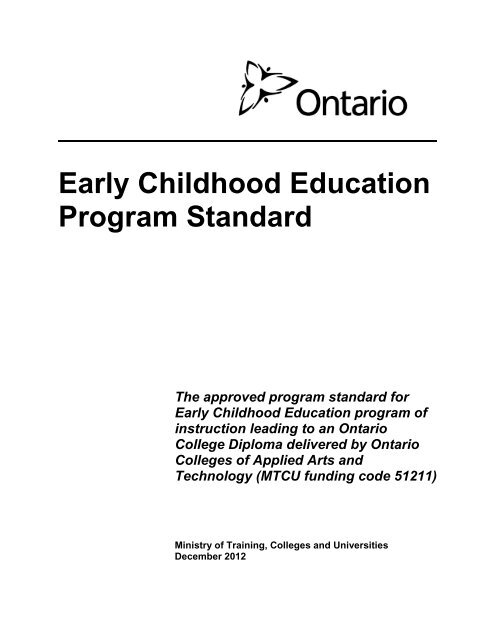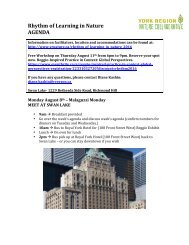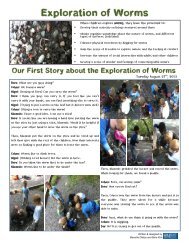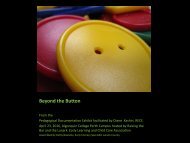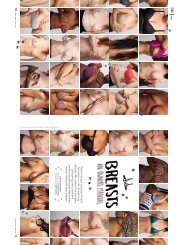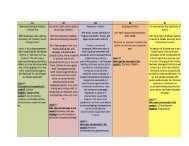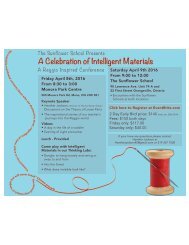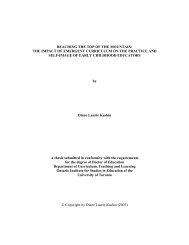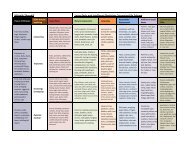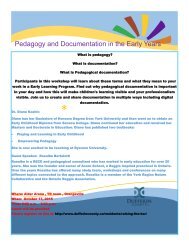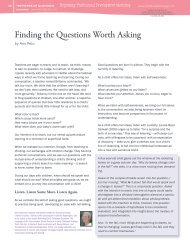Early Childhood Education Program Standard
You also want an ePaper? Increase the reach of your titles
YUMPU automatically turns print PDFs into web optimized ePapers that Google loves.
<strong>Early</strong> <strong>Childhood</strong> <strong>Education</strong><br />
<strong>Program</strong> <strong>Standard</strong><br />
The approved program standard for<br />
<strong>Early</strong> <strong>Childhood</strong> <strong>Education</strong> program of<br />
instruction leading to an Ontario<br />
College Diploma delivered by Ontario<br />
Colleges of Applied Arts and<br />
Technology (MTCU funding code 51211)<br />
Ministry of Training, Colleges and Universities<br />
December 2012
Permission to Reproduce<br />
Permission is hereby granted to the following institutions to reproduce this<br />
document, in whole or in part, in print or by electronic means, for the following<br />
specific purposes, subject to the conditions that follow:<br />
1. By an Ontario college of applied arts and technology for the purposes of<br />
implementation of the program standard within a college program,<br />
including for the purpose of informing students, potential students,<br />
program advisory committees or others about programs of study.<br />
2. By an educational institution or school, for the purpose of informing<br />
prospective college students about programs of study at Ontario colleges<br />
of applied arts and technology.<br />
Conditions:<br />
1. Every reproduction must be marked “©2012, Queen’s Printer for Ontario”<br />
at the beginning of the document or any part of it that is reproduced.<br />
2. No other uses may be made of the document.<br />
3. The document may not be reproduced for sale.<br />
4. The Ministry may revoke the permission to reproduce at any time.<br />
For permission to copy this document, in whole or in part, for other purposes or<br />
by other institutions, please contact<br />
Ministry of Training, Colleges and Universities<br />
<strong>Program</strong>s Branch, <strong>Program</strong> <strong>Standard</strong>s and Evaluation Unit<br />
23 rd floor, Mowat Block<br />
900 Bay Street<br />
Toronto, Ontario<br />
M7A 1L2<br />
Telephone: (416) 325-2874<br />
E-mail: susan.golets@ontario.ca<br />
Inquiries regarding specific <strong>Early</strong> <strong>Childhood</strong> <strong>Education</strong> programs offered by<br />
colleges of applied arts and technology in Ontario should be directed to the<br />
relevant college.<br />
This publication is available on the Ministry's Website.<br />
Cette publication est disponible sur le site Web du ministère.<br />
©2012, Queen’s Printer for Ontario<br />
ISBN 978-1-4606-0353-6 (PDF)<br />
Ce document est disponible en français.
Acknowledgements<br />
The Ministry of Training, Colleges and Universities acknowledges with thanks the<br />
significant contribution of the many individuals and organizations who<br />
participated in the development of this program standard. In particular, the<br />
Ministry of Training, Colleges and Universities would like to acknowledge the<br />
important roles of<br />
• all individuals and organizations who participated in the consultations;<br />
• the coordinators of <strong>Early</strong> <strong>Childhood</strong> <strong>Education</strong> <strong>Program</strong>s for their<br />
assistance throughout the project, the project officer who led the<br />
development of the vocational standard, Christine Foster, seconded<br />
faculty member from Algonquin and Louise Campagna, seconded faculty<br />
member from La Cité Collégiale.
Table of Contents<br />
I. Introduction ............................................................................................................ 1<br />
Development of System-Wide <strong>Program</strong> <strong>Standard</strong>s ............................................................ 1<br />
<strong>Program</strong> <strong>Standard</strong>s ........................................................................................................... 1<br />
The Expression of <strong>Program</strong> <strong>Standard</strong>s as Vocational Learning Outcomes ........................ 2<br />
The Presentation of the Vocational Learning Outcomes .................................................... 2<br />
The Development of a <strong>Program</strong> <strong>Standard</strong> ......................................................................... 2<br />
Updating the <strong>Program</strong> <strong>Standard</strong> ........................................................................................ 3<br />
II. Vocational <strong>Standard</strong> .............................................................................................. 4<br />
Preamble ........................................................................................................................... 4<br />
Synopsis of the Vocational Learning Outcomes ................................................................ 6<br />
The Vocational Learning Outcomes................................................................................... 8<br />
Glossary ...........................................................................................................................19<br />
III. Essential Employability Skills ............................................................................. 22<br />
Context .............................................................................................................................22<br />
Skill Categories ................................................................................................................22<br />
Application and Implementation ........................................................................................22<br />
IV. General <strong>Education</strong> Requirement ......................................................................... 25<br />
Requirement .....................................................................................................................25<br />
Purpose ............................................................................................................................25<br />
Themes ............................................................................................................................26
I. Introduction<br />
This document is the <strong>Program</strong> <strong>Standard</strong> for the <strong>Early</strong> <strong>Childhood</strong> <strong>Education</strong><br />
program of instruction leading to an Ontario College Diploma delivered by<br />
Ontario colleges of applied arts and technology (MTCU funding code 51211).<br />
Development of System-Wide <strong>Program</strong> <strong>Standard</strong>s<br />
In 1993, the Government of Ontario initiated program standards development<br />
with the objectives of bringing a greater degree of consistency to college<br />
programming offered across the province, broadening the focus of college<br />
programs to ensure graduates have the skills to be flexible and to continue to<br />
learn and adapt, and providing public accountability for the quality and relevance<br />
of college programs.<br />
The <strong>Program</strong> <strong>Standard</strong>s and Evaluation Unit of the Ministry of Training, Colleges<br />
and Universities has responsibility for the development, review, and approval of<br />
system-wide standards for programs of instruction at Ontario colleges of applied<br />
arts and technology.<br />
<strong>Program</strong> <strong>Standard</strong>s<br />
<strong>Program</strong> standards apply to all similar programs of instruction offered by colleges<br />
across the province. Each program standard for a postsecondary program<br />
includes the following elements:<br />
• Vocational standard (the vocationally specific learning outcomes which<br />
apply to the program of instruction in question),<br />
• Essential employability skills (the essential employability skills learning<br />
outcomes which apply to all programs of instruction); and<br />
• General education requirement (the requirement for general education<br />
in postsecondary programs of instruction).<br />
Collectively, these elements outline the essential skills and knowledge that a<br />
student must reliably demonstrate in order to graduate from the program.<br />
Individual colleges of applied arts and technology offering the program of<br />
instruction determine the specific program structure, delivery methods, and other<br />
curriculum matters to be used in assisting students to achieve the outcomes<br />
articulated in the standard. Individual colleges also determine whether additional<br />
local learning outcomes will be required to reflect specific local needs and/or<br />
interests.<br />
<strong>Early</strong> <strong>Childhood</strong> <strong>Education</strong> <strong>Program</strong> <strong>Standard</strong> 1
The Expression of <strong>Program</strong> <strong>Standard</strong>s as Vocational Learning<br />
Outcomes<br />
Vocational learning outcomes represent culminating demonstrations of learning<br />
and achievement. They are not simply a listing of discrete skills, nor broad<br />
statements of knowledge and comprehension. In addition, vocational learning<br />
outcomes are interrelated and cannot be viewed in isolation of one another. As<br />
such, they should be viewed as a comprehensive whole. They describe<br />
performances that demonstrate that significant integrated learning by graduates<br />
of the program has been achieved and verified.<br />
Expressing standards as vocational learning outcomes ensures consistency in<br />
the outcomes for program graduates, while leaving to the discretion of individual<br />
colleges curriculum matters such as the specific program structure and delivery<br />
methods.<br />
The Presentation of the Vocational Learning Outcomes<br />
The vocational learning outcome statements set out the culminating<br />
demonstration of learning and achievement that the student must reliably<br />
demonstrate before graduation.<br />
The elements of the performance for each outcome define and clarify the level<br />
and quality of performance necessary to meet the requirements of the vocational<br />
learning outcome. However, it is the performance of the vocational learning<br />
outcome itself on which students are evaluated. The elements of performance<br />
are indicators of the means by which the student may proceed to satisfactory<br />
performance of the vocational learning outcome. The elements of performance<br />
do not stand alone but rather in reference to the vocational learning outcome of<br />
which they form a part.<br />
The Development of a <strong>Program</strong> <strong>Standard</strong><br />
In establishing the standards development initiative, the Government determined<br />
that all postsecondary programs of instruction should include vocational skills<br />
coupled with a broader set of essential skills. This combination is considered<br />
critical to ensuring that college graduates have the skills required to be<br />
successful both upon graduation from the college program and throughout their<br />
working and personal lives.<br />
A program standard is developed through a broad consultation process involving<br />
a range of stakeholders with a direct interest in the program area, including<br />
employers, professional associations, universities, secondary schools, and<br />
program graduates working in the field, in addition to students, faculty, and<br />
administrators at the colleges themselves. It represents a consensus of<br />
<strong>Early</strong> <strong>Childhood</strong> <strong>Education</strong> <strong>Program</strong> <strong>Standard</strong> 2
participating stakeholders on the essential learning that all program graduates<br />
should have achieved.<br />
Updating the <strong>Program</strong> <strong>Standard</strong><br />
The Ministry of Training, Colleges and Universities will undertake regular reviews<br />
of the vocational learning outcomes for this program to ensure that the <strong>Early</strong><br />
<strong>Childhood</strong> <strong>Education</strong> <strong>Program</strong> <strong>Standard</strong> remains appropriate and relevant to the<br />
needs of students and employers across the Province of Ontario. To confirm that<br />
this document is the most up-to-date release, contact the Ministry of Training,<br />
Colleges and Universities.<br />
<strong>Early</strong> <strong>Childhood</strong> <strong>Education</strong> <strong>Program</strong> <strong>Standard</strong> 3
II. Vocational <strong>Standard</strong><br />
All graduates of <strong>Early</strong> <strong>Childhood</strong> <strong>Education</strong> programs have achieved the ten vocational<br />
learning outcomes (VLOs) listed in the following pages, in addition to achieving the<br />
essential employability skills (EES) learning outcomes and meeting the general<br />
education (GE) requirement. Graduates of Native or Aboriginal <strong>Early</strong> <strong>Childhood</strong><br />
<strong>Education</strong> programs (MTCU Code 51211) have achieved outcomes one to ten and an<br />
additional outcome eleven specific to Aboriginal <strong>Early</strong> <strong>Childhood</strong> <strong>Education</strong> programs.<br />
Preamble<br />
The <strong>Early</strong> <strong>Childhood</strong> <strong>Education</strong> program prepares graduates to work with infants,<br />
toddlers, preschool and school-aged children* and their families* in a variety of early<br />
learning settings including childcare centres, community child and family* support<br />
centres, home-based child care, Full Day <strong>Early</strong> Learning Kindergarten programs, school<br />
readiness and early intervention programs.<br />
Graduates create safe, healthy and inclusive* early learning environments* that support<br />
equitable and accessible learning opportunities for children* with diverse abilities,<br />
interests and ideas, and their families*. <strong>Early</strong> childhood educators work collaboratively<br />
with colleagues, children* and families* from diverse* cultures*, experiences and<br />
backgrounds. <strong>Early</strong> childhood educators form partnerships with families*, and support<br />
their parenting through ongoing communication, guidance and education. Graduates<br />
form collaborative relationships with professionals from other disciplines to support<br />
holistic development* of all children*.<br />
<strong>Early</strong> childhood educators establish responsive relationships* with children* and<br />
families* to support the optimal development* and learning of all children*. In addition,<br />
early childhood educators acknowledge that there is variability among children* and<br />
recognize potential areas that may require referral for further assessment and/or<br />
intervention.<br />
Graduates design and implement quality play-based* early learning curriculum* and<br />
programs that support the learning needs of individuals and groups of children*, as well<br />
as their families*. <strong>Early</strong> childhood educators capitalize on spontaneous events in order<br />
to support child-initiated learning and to promote learning that arouses curiosity and<br />
imagination. Graduates evaluate and revise curriculum* based on regular observations<br />
and analysis of children’s* development* and their responses to the curriculum* and<br />
goals of the program.<br />
Graduates have knowledge of current legislation related to early learning environments*<br />
and recognize the interconnection of governing legislation, code of ethics, professional<br />
practice standards, and administrative responsibilities in order to provide support and<br />
guidance to children* and their families*.<br />
Along with other early learning professionals and community partners, early childhood<br />
<strong>Early</strong> <strong>Childhood</strong> <strong>Education</strong> <strong>Program</strong> <strong>Standard</strong> 4
educators function in advocacy* roles for children* and families* and for quality early<br />
learning environments*.<br />
Graduates of the <strong>Early</strong> <strong>Childhood</strong> <strong>Education</strong> program base their work with children* and<br />
families* on relevant pedagogy*, theories and evidence-based practices*, making<br />
informed choices based on their professional knowledge. Core professional values of<br />
care, respect, trust and integrity enable graduates to formally recognize their<br />
commitment to children*, families*, colleagues, and the community and to the<br />
profession of early childhood education.<br />
<strong>Early</strong> childhood educators engage in reflective practice and commit to ongoing<br />
professional development to enhance their practice. Graduates are aware of the need to<br />
responsibly address ethical dilemmas that arise when working in early childhood<br />
education settings and practice in accordance with the College of <strong>Early</strong> <strong>Childhood</strong><br />
Educators Code of Ethics and <strong>Standard</strong>s of Practice (College of <strong>Early</strong> <strong>Childhood</strong><br />
Educators, 2011).<br />
<strong>Early</strong> <strong>Childhood</strong> Educators are governed by the <strong>Early</strong> <strong>Childhood</strong> Educators Act, 2007.<br />
Registration with the College of <strong>Early</strong> <strong>Childhood</strong> Educators as a Registered <strong>Early</strong><br />
<strong>Childhood</strong> Educator (RECE) is required for practice in the province of Ontario.<br />
There are opportunities for graduates to pursue further educational qualifications and<br />
degree completion. Graduates should contact individual colleges for further details.<br />
Endnote: The Ontario Council on Articulation and Transfer (ONCAT) maintains the<br />
provincial postsecondary credit transfer portal, ONTransfer and the Ontario<br />
Postsecondary Transfer Guide (OPTG) at<br />
http://www.ocutg.on.ca/www/index_en.php?page=the_ontario_postsecondary_transfer_<br />
guide<br />
*See Glossary<br />
<strong>Early</strong> <strong>Childhood</strong> <strong>Education</strong> <strong>Program</strong> <strong>Standard</strong> 5
Synopsis of the Vocational Learning Outcomes<br />
<strong>Early</strong> <strong>Childhood</strong> <strong>Education</strong> (Ontario College Diploma)<br />
The graduate has reliably demonstrated the ability to<br />
1. design, implement and evaluate inclusive* and play-based* early<br />
learning curriculum* and programs that support children’s* holistic<br />
development* and are responsive to individual children’s* and<br />
groups of children’s* observed abilities, interests and ideas.<br />
2. establish and maintain inclusive* early learning environments* that<br />
support diverse*, equitable and accessible developmental and<br />
learning opportunities for all children* and their families*.<br />
3. select and use a variety of screening tools, observation and<br />
documentation strategies to review, support and promote children’s*<br />
learning across the continuum of early childhood development*.<br />
4. establish and maintain responsive relationships* with individual<br />
children*, groups of children* and families*.<br />
5. assess, develop and maintain safe, healthy and quality early learning<br />
environments* which meet the requirements of current legislation,<br />
agency policies and evidence-based practices* in early learning.<br />
6. prepare and use professional written, verbal, nonverbal and<br />
electronic communications when working with children*, families*,<br />
colleagues, employers, and community partners.<br />
7. identify, select and apply relevant legislation, regulations, College of<br />
<strong>Early</strong> <strong>Childhood</strong> Educators <strong>Standard</strong>s of Practice and Code of<br />
Ethics, policies and evidence-based practice* guidelines, and<br />
interpret their impact on a variety of early learning environments*.<br />
8. apply a developing personal philosophy of early learning in<br />
accordance with ethical and professional standards* of early<br />
childhood education practice.<br />
9. advocate* for quality early learning environments* and collaborate<br />
with members of the early learning team, families* and community<br />
partners to establish and promote such settings.<br />
10. engage in reflective practice, develop learning goals and maintain an<br />
ongoing professional development plan in accordance with<br />
evidence-based practices* in early learning and related fields.<br />
<strong>Early</strong> <strong>Childhood</strong> <strong>Education</strong> <strong>Program</strong> <strong>Standard</strong> 6
VLO 11 is specific to ECE Diploma programs that are known as Aboriginal <strong>Early</strong><br />
<strong>Childhood</strong> <strong>Education</strong> <strong>Program</strong>s (MTCU Code 51211). Graduates of these<br />
programs have reliably demonstrated Vocational Outcomes 1-10 in addition to<br />
VLO 11.<br />
The graduate has reliably demonstrated the ability to<br />
11. plan, implement and evaluate Aboriginal early learning curriculum*,<br />
programs and environments that promote children’s*, families* and<br />
communities knowledge of and respect for Aboriginal peoples and<br />
their cultures*.<br />
*See Glossary<br />
Note: The learning outcomes have been numbered as a point of reference; numbering does not<br />
imply prioritization, sequencing, nor weighting of significance.<br />
<strong>Early</strong> <strong>Childhood</strong> <strong>Education</strong> <strong>Program</strong> <strong>Standard</strong> 7
The Vocational Learning Outcomes<br />
The graduate has reliably demonstrated the ability to<br />
1. design, implement and evaluate inclusive* and play-based* early<br />
learning curriculum* and programs that support children’s* holistic<br />
development* and are responsive to individual and groups of<br />
children’s* observed abilities, interests and ideas.<br />
Elements of the Performance<br />
●<br />
●<br />
●<br />
●<br />
●<br />
●<br />
●<br />
●<br />
●<br />
●<br />
●<br />
●<br />
●<br />
observe and identify the learning of individual children* and groups along<br />
a continuum of development* and in relation to learning expectations and<br />
holistic development*<br />
apply principles of early learning pedagogy* to curriculum* and program<br />
development<br />
identify and apply best practices based on current and relevant research<br />
findings, literature, and other resources to develop quality programs and<br />
curriculum*<br />
identify and select a variety of curriculum* models and approaches and<br />
determine the appropriateness for application to curriculum* and program<br />
development<br />
interact with children* to observe their emerging abilities, interests and<br />
ideas<br />
design inclusive* curriculum* that incorporates learning throughout all<br />
activities of the day and reflects children’s* daily lived experiences<br />
use a variety of strategies to support learning through inquiry and playbased*<br />
experiences<br />
design, implement and evaluate early learning opportunities to foster the<br />
development and appreciation of music and creative arts<br />
promote learning opportunities in natural settings that foster an<br />
understanding of and appreciation for the environment<br />
facilitate inclusive* learning experiences based on accurate ongoing and<br />
systematic observation of children*<br />
evaluate curriculum* and programs based on observation and analysis of<br />
children's* behaviour and level of participation<br />
revise and adapt curriculum* and programs when necessary, in<br />
accordance with individual abilities and approaches to learning, in order to<br />
optimize children’s development* and learning<br />
evaluate early learning curriculum* and programs to determine if<br />
children's* needs are met and their abilities, interests and ideas are<br />
acknowledged<br />
* See Glossary<br />
<strong>Early</strong> <strong>Childhood</strong> <strong>Education</strong> <strong>Program</strong> <strong>Standard</strong> 8
2. The graduate has reliably demonstrated the ability to<br />
establish and maintain inclusive* early learning environments* that<br />
support diverse*, equitable and accessible developmental and<br />
learning opportunities for all children* and their families*.<br />
Elements of the Performance<br />
●<br />
●<br />
●<br />
●<br />
●<br />
●<br />
●<br />
●<br />
●<br />
●<br />
●<br />
●<br />
●<br />
provide a welcoming and nurturing environment for all children* and their<br />
families*<br />
promote a sense of belonging and acceptance in all children* within a<br />
variety of learning environments<br />
apply responsive and inclusive* practices in all aspects of early learning<br />
environments*<br />
identify and respond to opportunities which enhance and extend all<br />
children’s* natural inquisitiveness<br />
foster inclusive* learning environments that allow all children* to<br />
participate in ways that are meaningful and recognize individual abilities<br />
and approaches to learning<br />
establish partnerships with children* and families* from diverse*<br />
communities<br />
support the development and learning of individual children* within the<br />
context of their family*, culture* and community<br />
establish learning environments that support positive behaviour in all<br />
children*<br />
design, set up and modify the physical environment to support all<br />
children’s* ongoing development and learning<br />
provide learning materials and opportunities that are culturally inclusive*,<br />
diverse* and reflect anti-bias (Child Care Human Resources Sector<br />
Council: Occupational <strong>Standard</strong>s for <strong>Early</strong> <strong>Childhood</strong> Educators , 2010)<br />
adapt learning opportunities and early learning environments* for children*<br />
living with special needs*<br />
provide flexibility and choice in learning materials and opportunities in<br />
order to optimize development and learning for all children* and their<br />
families*<br />
select and use appropriate technology and assistive technological tools to<br />
optimize all children’s development* and learning<br />
* See Glossary<br />
<strong>Early</strong> <strong>Childhood</strong> <strong>Education</strong> <strong>Program</strong> <strong>Standard</strong> 9
3. The graduate has reliably demonstrated the ability to<br />
select and use a variety of screening tools, observation and<br />
documentation strategies to review, support and promote children’s*<br />
learning across the continuum of early childhood development*.<br />
Elements of the Performance<br />
●<br />
●<br />
●<br />
●<br />
●<br />
●<br />
●<br />
●<br />
●<br />
●<br />
●<br />
●<br />
●<br />
select and use data collection strategies and tools that are linguistically<br />
and culturally appropriate for identified children*<br />
use appropriate strategies to identify and interpret children's* abilities,<br />
interests and ideas<br />
identify and respect the variations that occur in children’s* development,<br />
abilities and interests<br />
gather relevant information and observations about children* from<br />
families*, colleagues and other professionals<br />
use a variety of observation techniques* to enhance work with children*,<br />
families*, and colleagues<br />
use and assess developmental screening tools to identify children*<br />
requiring further assessment, intervention or referral<br />
share observations of children’s* abilities, interests and ideas with family*,<br />
colleagues and other professionals<br />
monitor children's* development and assess on an ongoing and<br />
systematic basis<br />
use a variety of methods to document children’s* development and<br />
learning such as, portfolios, checklists, anecdotal records and diary<br />
recordings.<br />
document and report observations in a professional manner<br />
identify and select technology tools to facilitate documentation and recordkeeping<br />
comply with all required documentation policies and procedures<br />
safeguard the privacy and confidentiality of child and family* information<br />
* See Glossary<br />
<strong>Early</strong> <strong>Childhood</strong> <strong>Education</strong> <strong>Program</strong> <strong>Standard</strong> 10
4. The graduate has reliably demonstrated the ability to<br />
establish and maintain responsive relationships* with individual<br />
children*, groups of children* and families*.<br />
Elements of the Performance<br />
●<br />
●<br />
●<br />
●<br />
●<br />
●<br />
●<br />
●<br />
●<br />
●<br />
●<br />
●<br />
●<br />
●<br />
●<br />
initiate genuine, authentic interactions with children* and their families*<br />
establish respectful partnerships with families* which promote involvement<br />
in children’s* early learning<br />
identify the valuable input that parents/guardians contribute as experts in<br />
their children’s* abilities, interests and ideas<br />
recommend and support families’* access to appropriate community<br />
resources<br />
communicate children’s* developmental progress to families* in an<br />
ongoing manner<br />
communicate to families* the benefits of inclusive* and play-based* early<br />
learning opportunities<br />
respond with sensitivity* to children's* and parents’/guardians’ behaviours<br />
use a variety of positive guidance techniques* that support self-regulation*<br />
and positive behaviour in children*<br />
provide children* with strategies to develop self control, self-regulation*,<br />
resiliency and autonomy<br />
promote competency and positive self esteem in children* and families*<br />
model respectful relationships which are trustworthy and inclusive*<br />
support the development of positive pro-social behaviour<br />
engage with children* to model and support their successful interactions in<br />
groups<br />
engage children* in reflection on own learning as a means to develop<br />
insight and build on learning<br />
support children’s* transitions between daily activities and between home<br />
and school environments<br />
* See Glossary<br />
<strong>Early</strong> <strong>Childhood</strong> <strong>Education</strong> <strong>Program</strong> <strong>Standard</strong> 11
5. The graduate has reliably demonstrated the ability to<br />
assess, develop and maintain safe, healthy and quality early learning<br />
environments* which meet the requirements of current legislation,<br />
agency policies and evidence-based practices* in early learning.<br />
Elements of the Performance<br />
●<br />
●<br />
●<br />
●<br />
●<br />
●<br />
●<br />
●<br />
●<br />
●<br />
●<br />
plan and provide healthy and safe indoor and outdoor environments and<br />
programming in accordance with current legislation, guidelines and<br />
agency policy<br />
use environmental rating scales such as the <strong>Early</strong> <strong>Childhood</strong> Environment<br />
Rating Scale (ECERS) to assess learning environments<br />
assess and adapt health and safety environments and practices based on<br />
current research and quality criteria<br />
consult and plan with families* and relevant professionals to promote and<br />
support nutritional health in all children*<br />
meet specific health needs of children* according to individual needs and<br />
developmental requirements<br />
interpret and apply regulations of the Occupational Health and Safety Act,<br />
1990 to early learning settings<br />
plan and adapt practices to enhance safety and accessibility for children*<br />
and others in the learning environment<br />
respond appropriately to unsafe and emergency situations following<br />
agency policies and procedures<br />
create opportunities for families’* learning and support related to health<br />
promotion, environmental hazards and safety practices<br />
promote regular, healthy physical activity in all children*<br />
model a healthy lifestyle<br />
* See Glossary<br />
<strong>Early</strong> <strong>Childhood</strong> <strong>Education</strong> <strong>Program</strong> <strong>Standard</strong> 12
6. The graduate has reliably demonstrated the ability to<br />
prepare and use professional written, verbal, nonverbal and<br />
electronic communications when working with children*, families*,<br />
colleagues, employers and community partners.<br />
Elements of the Performance<br />
• use active listening techniques<br />
• evaluate one's own interpersonal communication skills through selfawareness<br />
and ongoing personal reflection and taking into consideration<br />
peer and supervisor’s feedback<br />
• effect change in one’s own communication, based on feedback received<br />
• use non-verbal language that is consistent with intended message<br />
• be respectful, positive and open in all communication without judgment or<br />
personal bias<br />
• validate communication initiated by individual children*, families* and<br />
colleagues<br />
• model respect for diversity* by monitoring and modifying interactions<br />
• adapt communication based on the needs of children* and their families*<br />
considering factors such as culture*, age, ability and language<br />
• communicate information comprehensively, concisely, accurately,<br />
objectively and in a timely manner<br />
• establish and maintain ongoing reciprocal communication with families*<br />
regarding their children*<br />
• maintain confidentiality in all written, verbal, and electronic<br />
communications<br />
• communicate professionally in written documentation including<br />
vocabulary, grammar, spelling and format appropriate to early learning<br />
settings<br />
• model and provide positive conflict resolution strategies in all relationships<br />
with children*, families*, colleagues, employers and others<br />
• communicate effectively, respectfully and tactfully with children*, families*,<br />
colleagues and other professionals<br />
• select and use appropriate technologies for professional electronic<br />
communications and record keeping<br />
• establish and maintain effective communication as a member of the early<br />
learning team<br />
* See Glossary<br />
<strong>Early</strong> <strong>Childhood</strong> <strong>Education</strong> <strong>Program</strong> <strong>Standard</strong> 13
7. The graduate has reliably demonstrated the ability to<br />
identify, select and apply relevant legislation, regulations, College of<br />
<strong>Early</strong> <strong>Childhood</strong> Educators <strong>Standard</strong>s of Practice and Code of<br />
Ethics, policies and evidence-based practice* guidelines and<br />
interpret their impact on a variety of early learning environments*.<br />
Elements of the Performance<br />
●<br />
●<br />
●<br />
●<br />
identify and explain the roles and responsibilities (e.g., policy, funding,<br />
legislation) of all levels of government related to early learning<br />
environments*<br />
identify the impact of legislative and regulatory bodies, policy, funding, and<br />
administrative practices on the structure and quality of early learning<br />
programs<br />
practise in compliance with the Code of Ethics and <strong>Standard</strong>s of Practice<br />
for <strong>Early</strong> <strong>Childhood</strong> Educators (College of <strong>Early</strong> <strong>Childhood</strong> Educators,<br />
2011)<br />
comply with key legislation impacting early learning environments<br />
including the <strong>Early</strong> <strong>Childhood</strong> Educators Act, 2007, the Day Nurseries Act,<br />
1990, the Child and Family Services Act, 1990 and the <strong>Education</strong> Act,<br />
1990<br />
• determine reasonable grounds to suspect when a child is at risk for abuse<br />
or neglect and may be in need of protection, and take appropriate action in<br />
reporting these incidences in accordance with the Ontario Child and<br />
Family Services Act, 1990<br />
●<br />
●<br />
●<br />
provide rationale for professional self-regulation and accountability in the<br />
practice of early childhood education<br />
identify and maintain quality assurance practices in early learning<br />
environments*<br />
identify and act in accordance with agency policies and procedures<br />
including school board policies related to practice in Full Day <strong>Early</strong><br />
Learning Kindergarten classrooms<br />
* See Glossary<br />
<strong>Early</strong> <strong>Childhood</strong> <strong>Education</strong> <strong>Program</strong> <strong>Standard</strong> 14
8. The graduate has reliably demonstrated the ability to<br />
apply a developing personal philosophy of early learning in<br />
accordance with ethical and professional standards* of early<br />
childhood education practice.<br />
Elements of the Performance<br />
• analyze a variety of philosophical theories and historical trends related to<br />
the early childhood education practice<br />
• maintain congruency between one's personal philosophy of early learning<br />
and interactions with children*, families* and colleagues<br />
• act in accordance with the Code of Ethics and <strong>Standard</strong>s of Practice for<br />
<strong>Early</strong> <strong>Childhood</strong> Educators (College of <strong>Early</strong> <strong>Childhood</strong> Educators, 2011)<br />
• identify and use evidenced-based resources to build one’s own developing<br />
philosophy of early childhood learning<br />
• reflect on practice experiences and integrate them with theoretical<br />
perspectives when refining one’s own developing philosophy of early<br />
childhood learning<br />
* See Glossary<br />
<strong>Early</strong> <strong>Childhood</strong> <strong>Education</strong> <strong>Program</strong> <strong>Standard</strong> 15
9. The graduate has reliably demonstrated the ability to<br />
advocate* for quality early learning environments* and collaborate<br />
with members of the early learning team, families* and community<br />
partners to establish and promote such settings.<br />
Elements of the Performance<br />
●<br />
●<br />
●<br />
●<br />
●<br />
●<br />
●<br />
●<br />
●<br />
●<br />
protect and promote the rights of children* within their families* and<br />
communities<br />
work in partnership with families* and community partners to advocate* for<br />
quality, inclusive* early learning environments*<br />
model and support families* in advocating for their children*<br />
consult with other professionals on the early learning team to reflect their<br />
knowledge and value their respective roles and scope of practice<br />
participate in the planning and organization of the Full Day <strong>Early</strong> Learning<br />
Kindergarten program<br />
lead others in the planning and implementation of inclusive* and playbased*<br />
learning strategies in a variety of early learning environments*<br />
including daycare centres, homes and neighbourhood child and family<br />
centres<br />
collaborate and consult with other early learning professionals in the<br />
identification and referral of children* and families* to community<br />
resources<br />
advocate* for the advancement of early childhood education through<br />
professional networking and sharing<br />
support and guide colleagues and students in early learning settings<br />
communicate to the public the benefits of quality early learning<br />
environments*<br />
* See Glossary<br />
<strong>Early</strong> <strong>Childhood</strong> <strong>Education</strong> <strong>Program</strong> <strong>Standard</strong> 16
10. The graduate has reliably demonstrated the ability to<br />
engage in reflective practice, develop learning goals and maintain an<br />
ongoing professional development plan in accordance with<br />
evidenced-based practices* in early learning and related fields.<br />
Elements of the Performance<br />
●<br />
●<br />
●<br />
●<br />
●<br />
●<br />
●<br />
●<br />
●<br />
●<br />
use self-reflection and self-evaluation skills in an ongoing manner<br />
research and analyze current studies and evidenced-based practices* in<br />
early learning and support their integration into one’s own practice<br />
keep current with changes in the field and maintain contact with the early<br />
childhood learning community<br />
seek out and take advantage of professional development opportunities<br />
assess personal learning needs and develop realistic strategies to meet<br />
educational goals<br />
research and use support and resources for learning within personal and<br />
professional environments<br />
maintain all required certifications and training e.g., Cardiopulmonary<br />
Resuscitation (CPR), First Aid, anaphylaxis training, Workplace<br />
Hazardous Materials Information System (WHMIS)<br />
develop a written personal development plan with specific learning goals,<br />
resources and timeframes<br />
evaluate and document progress towards achieving professional learning<br />
goals and modify plan accordingly<br />
assess personal health and well-being and develop strategies to maintain<br />
a healthy work-life balance<br />
* See Glossary<br />
<strong>Early</strong> <strong>Childhood</strong> <strong>Education</strong> <strong>Program</strong> <strong>Standard</strong> 17
VLO 11 is specific to ECE Diploma programs that are known as Aboriginal <strong>Early</strong><br />
<strong>Childhood</strong> <strong>Education</strong> <strong>Program</strong>s (MTCU Code 51211). Graduates of these<br />
programs have reliably demonstrated Vocational Outcomes 1-10 in addition to<br />
VLO 11.<br />
11. The graduate has reliably demonstrated the ability to<br />
plan, implement and evaluate Aboriginal early learning curriculum*,<br />
programs and environments that promote children’s*, families* and<br />
communities knowledge of and respect for Aboriginal peoples and<br />
their cultures*.<br />
Elements of the Performance<br />
●<br />
●<br />
●<br />
●<br />
●<br />
●<br />
●<br />
●<br />
●<br />
●<br />
●<br />
●<br />
●<br />
integrate a Generative Curriculum* model approach to early learning<br />
curriculum* and program development for Aboriginal children* and<br />
families*<br />
integrate community Elders and traditional knowledge as a means of<br />
transmitting cultural practices and ways of knowing into programs<br />
plan and implement curriculum* and programs consistent with Aboriginal<br />
philosophies, and cultural values<br />
assess programs based on culturally-relevant criteria<br />
situate early learning experiences within the community<br />
incorporate Aboriginal peoples stories and experiences into learning<br />
opportunities<br />
promote children’s* positive relationship with the natural environment<br />
using the outdoors creatively<br />
support and promote intergenerational teaching and learning opportunities<br />
support the transmission of traditional languages<br />
contribute to community development initiatives<br />
advocate* for quality and culturally relevant early learning for Aboriginal<br />
children* and families* through liaison with the community<br />
foster positive identification with their culture* of origin with Aboriginal<br />
children* and their families*<br />
mentor others in aboriginal early learning settings<br />
* See Glossary<br />
<strong>Early</strong> <strong>Childhood</strong> <strong>Education</strong> <strong>Program</strong> <strong>Standard</strong> 18
Glossary<br />
Advocacy - Actions to champion change, to extend or improve early learning<br />
opportunities and supports to children, families and early childhood educators.<br />
Children’s development - The sequential processes of growth and learning in<br />
which children come to acquire increasingly complex levels of moving, thinking,<br />
feeling and interacting with people and objects in the environment. Development<br />
involves both a gradual unfolding of biologically determined characteristics and<br />
the learning process. Children’s development is holistic and interdependent<br />
including physical, intellectual, language, emotional and social development. It is<br />
embedded in the context of family, culture and society (adapted from CECE:<br />
Code of Ethics and <strong>Standard</strong>s of Practice, 2011).<br />
Children – Refers to all children from birth to age twelve within the context of<br />
their individual family, social, economic, cultural, linguistic, spiritual and<br />
developmental diversities.<br />
Continuum of early childhood development – Describes the sequence of<br />
skills within broad domains of development that children can be expected to<br />
demonstrate. The developmental continuum represents stages as<br />
approximations only. Individual children, as well as groups of children, can be in<br />
various stages of development across domains depending on a range of<br />
variables (adapted from the Best Start Expert Panel (2007). <strong>Early</strong> Learning for<br />
Every Child Today (ELECT): A Framework for Ontario <strong>Early</strong> Learning Settings).<br />
Culture - The total way of life of a group of people including: their economic,<br />
family, religious, health, education systems, values and traditions; their form of<br />
government; their way of viewing the world; and, also the objects, artifacts,<br />
language, literature, arts, institutions, organizations, ideas and beliefs that make<br />
up symbolic and learned aspects of human society.<br />
Curriculum - An organized framework that delineates the learning opportunities<br />
provided to children, the processes through which children achieve the identified<br />
curricular goals, the practices which educators employ to help children achieve<br />
these goals, and the context in which educating and learning occur. Childdirected<br />
curriculum defines curriculum in its broadest sense, encompassing<br />
prevailing theories, approaches and models while following children’s<br />
developmental and interest cues and developed in collaboration with early<br />
childhood educators and families.<br />
Diverse/Diversity - Uniqueness that each person brings to the early learning<br />
environment including values and beliefs, culture and ethnicity, language,<br />
abilities, knowledge and interests, life experiences, socio-economic status,<br />
spirituality, gender, age and sexual orientation (adapted from Best Start Expert<br />
Panel (2007). <strong>Early</strong> Learning for Every Child Today (ELECT): A Framework for<br />
Ontario <strong>Early</strong> Learning Settings).<br />
<strong>Early</strong> <strong>Childhood</strong> <strong>Education</strong> <strong>Program</strong> <strong>Standard</strong> 19
<strong>Early</strong> learning environments - Child-centered environments that are focused on<br />
relationships between children, parents and early childhood professionals that<br />
provide, care, nurturing and education as a complex and coherent whole, with<br />
the goals of holistic development and overall well-being. It includes schedules,<br />
routines, physical environment, interactions, materials, activities and experiences<br />
(adapted from Best Start Expert Panel (2007). <strong>Early</strong> Learning for Every Child<br />
Today (ELECT): A Framework for Ontario <strong>Early</strong> Learning Settings).<br />
Ethical and professional standards - A core set of beliefs, values and<br />
responsibilities fundamental to this profession that serve to define the exemplary<br />
practices of early childhood education. The practice of <strong>Early</strong> <strong>Childhood</strong> <strong>Education</strong><br />
is regulated by the College of <strong>Early</strong> <strong>Childhood</strong> Educators in accordance with the<br />
<strong>Early</strong> <strong>Childhood</strong> Educator’s Act, 2007. It is the professional responsibility of all<br />
members of the College of <strong>Early</strong> <strong>Childhood</strong> Educators to meet and uphold the<br />
Code of Ethics and <strong>Standard</strong>s of Practice in their work in early learning settings.<br />
Evidence-based practice - The delivery of high quality early learning programs<br />
based on the best empirical evidence available, in conjunction with professional<br />
judgment (Best Start Expert Panel (2007). <strong>Early</strong> Learning for Every Child Today<br />
(ELECT): A Framework for Ontario <strong>Early</strong> Learning Settings).<br />
Family/families - A group of persons who are bound together over time by ties<br />
of mutual consent, birth and/or adoption/placement and/or legal guardianship<br />
who, together, assume responsibilities for physical, social, spiritual and emotional<br />
care of one another, addition of new members through procreation/adoption,<br />
socialization of children, and nurturance/love of one another.<br />
Generative Curriculum Model - A generative approach to Aboriginal early<br />
childhood education curriculum which focuses on developing curriculum from<br />
community-relevant knowledge sources e.g. Elders and other within the<br />
community and co-creating knowledge through shared experiences, reflection<br />
and dialogue (Ball, 2004, As if Indigenous Knowledge and Communities<br />
Mattered: Transformative <strong>Education</strong> in First Nations Communities in Canada).<br />
Holistic development - Describes an integrated approach to a child’s<br />
development, which takes into account the interrelationship among a child’s<br />
physical, emotional, intellectual, social, spiritual and cognitive development and<br />
life experiences, with special focus on the context of the child's family, culture,<br />
and community.<br />
Inclusive - An approach to practice in early learning settings where all children<br />
are accepted and served within a program and where each child and family<br />
experiences a sense of belonging and no child or family is stigmatized or<br />
marginalized. Inclusion means bringing people in rather than excluding them in<br />
thought, word or deed. Inclusive practice provides equal learning opportunity and<br />
full participation in all aspects of the early learning program by all children.<br />
<strong>Early</strong> <strong>Childhood</strong> <strong>Education</strong> <strong>Program</strong> <strong>Standard</strong> 20
(adapted from the College of <strong>Early</strong> <strong>Childhood</strong> Educators, (CECE): Code of Ethics<br />
and <strong>Standard</strong>s of Practice, 2011).<br />
Observation techniques - A systematic strategy for collecting information on the<br />
behaviour, emotional responses, interests, abilities and patterns of development<br />
of an individual child or a group of children within a learning environment, and/or<br />
aspects of that environment. Techniques may include participant observation,<br />
portfolios, learning stories, developmental screening tools, checklists, anecdotal<br />
records and diary recordings.<br />
Pedagogy - The study of the body of knowledge which seeks to understand how<br />
learning takes place and the philosophy that supports that understanding of<br />
learning (adapted from Best Start Expert Panel (2007). <strong>Early</strong> Learning for Every<br />
Child Today (ELECT): A Framework for Ontario <strong>Early</strong> Learning Settings).<br />
Play-based - An educational approach which builds upon children’s natural<br />
inclination to make sense of the world through play, where early childhood<br />
practitioners participate in play, guiding children’s planning, decision-making and<br />
communications, and extending children’s explorations with narrative, novelty<br />
and challenges (Best Start Expert Panel (2007). <strong>Early</strong> Learning for Every Child<br />
Today (ELECT): A Framework for Ontario <strong>Early</strong> Learning Settings).<br />
Positive guidance techniques - Strategies used to support children’s selfregulation*<br />
and the development of empathy and social competence while<br />
preserving each child’s sense of worth, autonomy, sense of inclusion in the group<br />
and trust in the educator (Best Start Expert Panel (2007). <strong>Early</strong> Learning for<br />
Every Child Today (ELECT): A Framework for Ontario <strong>Early</strong> Learning Settings).<br />
Responsive relationships - Positive and beneficial interactions between adults<br />
and children that occur when adults observe and read children’s signals and<br />
communication and respond with understanding to give children a feeling of<br />
being cared for and cared about (Best Start Expert Panel (2007). <strong>Early</strong> Learning<br />
for Every Child Today (ELECT): A Framework for Ontario <strong>Early</strong> Learning<br />
Settings).<br />
Respond with sensitivity - Responding to children in a manner that is timely<br />
and in direct response to a child's nonverbal and/or verbal signals, taking into<br />
account the child's temperament, background, abilities, interests, ideas and the<br />
situation. These interactions, always positive, are adaptable to individual<br />
children's behaviour.<br />
Self-regulation - The ability to monitor and control emotions, behaviour and<br />
attention, (Best Start Expert Panel (2007). <strong>Early</strong> Learning for Every Child Today<br />
(ELECT): A Framework for Ontario <strong>Early</strong> Learning Settings).<br />
<strong>Early</strong> <strong>Childhood</strong> <strong>Education</strong> <strong>Program</strong> <strong>Standard</strong> 21
III. Essential Employability Skills<br />
Context<br />
All graduates of the <strong>Early</strong> <strong>Childhood</strong> <strong>Education</strong> program of instruction have<br />
reliably demonstrated the essential employability skills learning outcomes listed<br />
on the following pages, in addition to achieving the vocational learning outcomes<br />
and meeting the general education requirement.<br />
Essential Employability Skills (EES) are skills that, regardless of a student’s<br />
program or discipline, are critical for success in the workplace, in day-to-day<br />
living, and for lifelong learning.<br />
The teaching and attainment of these EES for students in, and graduates from,<br />
Ontario’s colleges of applied arts and technology are anchored in a set of three<br />
fundamental assumptions:<br />
• these skills are important for every adult to function successfully in society<br />
today;<br />
• our colleges are well equipped and well positioned to prepare graduates<br />
with these skills;<br />
• these skills are equally valuable for all graduates, regardless of the level of<br />
their credential, whether they pursue a career path, or they pursue further<br />
education.<br />
Skill Categories<br />
To capture these skills, the following six categories define the essential areas<br />
where graduates must demonstrate skills and knowledge.<br />
• Communication<br />
• Numeracy<br />
• Critical Thinking & Problem Solving<br />
• Information Management<br />
• Interpersonal<br />
• Personal<br />
Application and Implementation<br />
In each of the six skill categories, there are a number of defining skills, or sub<br />
skills, identified to further articulate the requisite skills identified in the main skill<br />
categories. The following chart illustrates the relationship between the skill<br />
categories, the defining skills within the categories, and learning outcomes to be<br />
achieved by graduates from all postsecondary programs of instruction that lead<br />
<strong>Early</strong> <strong>Childhood</strong> <strong>Education</strong> <strong>Program</strong> <strong>Standard</strong> 22
to an Ontario College credential.<br />
EES may be embedded in General <strong>Education</strong> or vocational courses, or<br />
developed through discrete courses. However these skills are developed, all<br />
graduates with Ontario College credentials must be able to reliably demonstrate<br />
the essential skills required in each of the six categories.<br />
SKILL CATEGORY<br />
COMMUNICATION<br />
NUMERACY<br />
CRITICAL<br />
THINKING &<br />
PROBLEM<br />
SOLVING<br />
DEFINING SKILLS:<br />
Skill areas to be<br />
demonstrated by<br />
graduates:<br />
• Reading<br />
• Writing<br />
• Speaking<br />
• Listening<br />
• Presenting<br />
• Visual literacy<br />
• Understanding and<br />
applying<br />
mathematical<br />
concepts and<br />
reasoning<br />
• Analyzing and<br />
using numerical<br />
data<br />
• Conceptualizing<br />
• Analysing<br />
• Synthesizing<br />
• Evaluating<br />
• Decision making<br />
• Creative and<br />
innovative thinking<br />
LEARNING OUTCOMES: The<br />
levels of achievement required by<br />
graduates.<br />
The graduate has reliably<br />
demonstrated the ability to:<br />
1. communicate clearly, concisely<br />
and correctly in the written,<br />
spoken, and visual form that<br />
fulfills the purpose and meets the<br />
needs of the audience.<br />
2. respond to written, spoken, or<br />
visual messages in a manner that<br />
ensures effective communication.<br />
3. execute mathematical operations<br />
accurately.<br />
4. apply a systematic approach to<br />
solve problems.<br />
5. use a variety of thinking skills to<br />
anticipate and solve problems.<br />
<strong>Early</strong> <strong>Childhood</strong> <strong>Education</strong> <strong>Program</strong> <strong>Standard</strong> 23
SKILL CATEGORY<br />
INFORMATION<br />
MANAGEMENT<br />
INTERPERSONAL<br />
PERSONAL<br />
DEFINING SKILLS:<br />
Skill areas to be<br />
demonstrated by<br />
graduates:<br />
• Gathering and<br />
managing<br />
information<br />
• Selecting and<br />
using appropriate<br />
tools and<br />
technology for a<br />
task or a project<br />
• Computer literacy<br />
• Internet skills<br />
• Team work<br />
• Relationship<br />
management<br />
• Conflict resolution<br />
• Leadership<br />
• Networking<br />
• Managing self<br />
• Managing change<br />
and being flexible<br />
and adaptable<br />
• Engaging in<br />
reflective practices<br />
• Demonstrating<br />
personal<br />
responsibility<br />
LEARNING OUTCOMES: The<br />
levels of achievement required by<br />
graduates.<br />
The graduate has reliably<br />
demonstrated the ability to:<br />
6. locate, select, organize, and<br />
document information using<br />
appropriate technology and<br />
information systems.<br />
7. analyze, evaluate, and apply<br />
relevant information from a variety<br />
of sources.<br />
8. show respect for the diverse<br />
opinions, values, belief systems,<br />
and contributions of others.<br />
9. interact with others in groups or<br />
teams in ways that contribute to<br />
effective working relationships<br />
and the achievement of goals.<br />
10. manage the use of time and<br />
other resources to complete<br />
projects.<br />
11. take responsibility for one’s own<br />
actions, decisions, and<br />
consequences.<br />
<strong>Early</strong> <strong>Childhood</strong> <strong>Education</strong> <strong>Program</strong> <strong>Standard</strong> 24
IV. General <strong>Education</strong> Requirement<br />
All graduates of the <strong>Early</strong> <strong>Childhood</strong> <strong>Education</strong> program have met the<br />
general education requirement described on the following pages, in<br />
addition to achieving the vocational and essential employability skills<br />
learning outcomes.<br />
Requirement<br />
Purpose<br />
The General <strong>Education</strong> Requirement for programs of instruction is stipulated in<br />
the Credentials Framework (Appendix A in the Minister’s Binding Policy Directive<br />
Framework for <strong>Program</strong>s of Instruction).<br />
For certificate programs: While the inclusion of General <strong>Education</strong> is locally<br />
determined for programs of instruction leading to either a college certificate or on<br />
Ontario College Certificate, it is recommended that graduates of the Ontario<br />
College Certificate programs have been engaged in learning that incorporates<br />
some breadth beyond the vocational field of study.<br />
In programs of instruction leading to either an Ontario College Diploma or an<br />
Ontario College Advanced Diploma, it is required that graduates have been<br />
engaged in learning that exposes them to at least one discipline outside their<br />
main field of study and increases their awareness of the society and culture in<br />
which they live and work. This will typically be accomplished by students taking 3<br />
to 5 courses (or the equivalent) designed discretely and separately from<br />
vocational learning opportunities.<br />
This general education learning would normally be delivered using a combination<br />
of required and elective processes.<br />
The purpose of General <strong>Education</strong> in the Ontario college system is to contribute<br />
to the development of citizens who are conscious of the diversity, complexity,<br />
and richness of the human experience; who are able to establish meaning<br />
through this consciousness; and, who, as a result, are able to contribute<br />
thoughtfully, creatively, and positively to the society in which they live and work.<br />
General <strong>Education</strong> strengthens student’s essential employability skills, such as<br />
critical analysis, problem solving, and communication, in the context of an<br />
exploration of topics with broad-based personal and/or societal importance.<br />
<strong>Early</strong> <strong>Childhood</strong> <strong>Education</strong> <strong>Program</strong> <strong>Standard</strong> 25
Themes<br />
The themes listed below will be used to provide direction to colleges in the<br />
development and identification of courses that are designed to fulfill the General<br />
<strong>Education</strong> Requirement for programs of instructions.<br />
Each theme provides a statement of Rationale and offers suggestions related to<br />
more specific topic areas that could be explored within each area. These<br />
suggestions are neither prescriptive nor exhaustive. They are included to provide<br />
guidance regarding the nature and scope of content that would be judged as<br />
meeting the intent and overall goals of General <strong>Education</strong>.<br />
1. Arts in Society:<br />
Rationale:<br />
The capacity of a person to recognize and evaluate artistic and creative<br />
achievements is useful in many aspects of his/her life. Since artistic expression is<br />
a fundamentally human activity, which both reflects and anticipates<br />
developments in the larger culture, its study will enhance the student’s cultural<br />
and self-awareness.<br />
Content:<br />
Courses in this area should provide students with an understanding of the<br />
importance of visual and creative arts in human affairs, of the artist’s and writer’s<br />
perceptions of the world and the means by which those perceptions are<br />
translated into the language of literature and artistic expression. They will also<br />
provide an appreciation of the aesthetic values used in examining works of art<br />
and possibly, a direct experience in expressing perceptions in an artistic medium.<br />
2. Civic Life:<br />
Rationale:<br />
In order for individuals to live responsibly and to reach their potential as<br />
individuals and as citizens of society, they need to understand the patterns of<br />
human relationships that underlie the orderly interactions of a society’s various<br />
structural units. Informed people will have knowledge of the meaning of civic life<br />
in relation to diverse communities at the local, national, and global level, and an<br />
awareness of international issues and the effects of these on Canada, and<br />
Canada’s place in the international community.<br />
Content:<br />
Courses in this area should provide students with an understanding of the<br />
meaning of freedoms, rights, and participation in community and public life, in<br />
addition to a working knowledge of the structure and function of various levels of<br />
government (municipal, provincial, national) in Canada and/or in an international<br />
context. They may also provide an historical understanding of major political<br />
<strong>Early</strong> <strong>Childhood</strong> <strong>Education</strong> <strong>Program</strong> <strong>Standard</strong> 26
issues affecting relations between the various levels of government in Canada<br />
and their constituents.<br />
3. Social and Cultural Understanding:<br />
Rationale:<br />
Knowledge of the patterns and precedents of the past provide the means for a<br />
person to gain an awareness of his or her place in contemporary culture and<br />
society. In addition to this awareness, students will acquire a sense of the main<br />
currents of their culture and that of other cultures over an extended period of time<br />
in order to link personal history to the broader study of culture.<br />
Content:<br />
Courses in this area are those that deal broadly with major social and cultural<br />
themes. These courses may also stress the nature and validity of historical<br />
evidence and the variety of historical interpretation of events. Courses will<br />
provide the students with a view and understanding of the impact of cultural,<br />
social, ethnic, or linguistic characteristics.<br />
4. Personal Understanding:<br />
Rationale:<br />
Educated people are equipped for life-long understanding and development of<br />
themselves as integrated physiological and psychological entities. They are<br />
aware of the ideal need to be fully functioning persons: mentally, physically,<br />
emotionally, socially, spiritually, and vocationally.<br />
Content:<br />
Courses in this area will focus on understanding the individual: his or her<br />
evolution; situation; relationship with others; place in the environment and<br />
universe; achievements and problems; and his or her meaning and purpose.<br />
They will also allow students the opportunity to study institutionalized human<br />
social behaviour in a systematic way. Courses fulfilling this requirement may be<br />
oriented to the study of the individual within a variety of contexts.<br />
5. Science and Technology:<br />
Rationale:<br />
Matter and energy are universal concepts in science, forming a basis for<br />
understanding the interactions that occur in living and non-living systems in our<br />
universe. Study in this area provides an understanding of the behaviour of matter<br />
that provides a foundation for further scientific study and the creation of broader<br />
understanding about natural phenomena.<br />
<strong>Early</strong> <strong>Childhood</strong> <strong>Education</strong> <strong>Program</strong> <strong>Standard</strong> 27
Similarly, the various applications and developments in the area of technology<br />
have an increasing impact on all aspects of human endeavour and have<br />
numerous social, economic, and philosophical implications. For example, the<br />
operation of computers to process data at high speed has invoked an interaction<br />
between machines and the human mind that is unique in human history. This<br />
development and other technological developments have a powerful impact on<br />
how we deal with many of the complex questions in our society.<br />
Content:<br />
Courses in this area should stress scientific inquiry and deal with basic or<br />
fundamental questions of science rather than applied ones. They may be<br />
formulated from traditional basic courses in such areas of study as biology,<br />
chemistry, physics, astronomy, geology, or agriculture. As well, courses related<br />
to understanding the role and functions of computers (e.g., data management<br />
and information processing), and assorted computer-related technologies, should<br />
be offered in a non-applied manner to provide students with an opportunity to<br />
explore the impact of these concepts and practices on their lives.<br />
<strong>Early</strong> <strong>Childhood</strong> <strong>Education</strong> <strong>Program</strong> <strong>Standard</strong> 28


